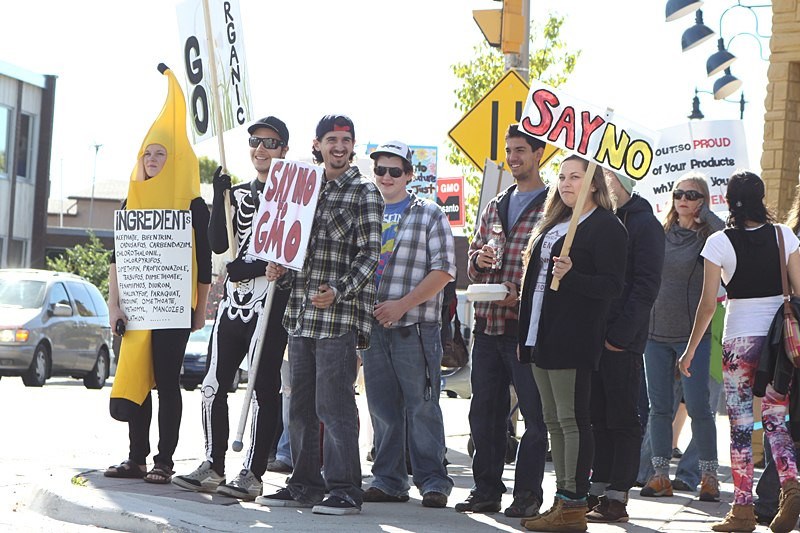A group of people in Thunder Bay are part of a global movement to raise awareness about the prevalence of genetically modified food.
Over 50 people took to Algoma Street on Saturday for a March Against Monsanto to protest against the use of genetically modified organisms (GMOs) in their food.
Local march organizer Lindsay White said people just want to know exactly what they’re consuming.
“What we’re really looking for is the labelling of genetically modified foods. It’s very difficult for people to spend the vast amounts of time to research what is genetically altered and what is not,” White said.
“Most of the food in our grocery stores have been banned in other countries.”
The protest mainly takes aim at Monsanto, a St. Louis-based company that created harmful chemicals such as the Agent Orange used in Vietnam, DDT, as well as various PCBs.
The company was also one of the first to experiment with genetic modifications.
Those taking part in the rally are against a company with such a dangerous past have no place in the food industry.
“Now they’ve found a market to make money in the food supply,” said Mike Ferrari, a biology student at Lakehead University. “You can’t trust a company like that whose main history is chemicals, and now they feel that food is a new area to make money.”
The march, which is being held in over 400 cities across the world, was scheduled to coincide with the World Food Day. This is the second such march in Thunder Bay this year, as there was one held previously in May.
White said it has become apparent that most consumers are unaware of the extent to which altered foods have permeated the marketplace.
“We are drawing awareness to genetically modified foods, which are actually in 85 per cent of the ingredients in our grocery stores,” she explained. “The primarily modified foods are corn, soy, canola and regular sugar which is in most processed foods.”
There are some methods to ensure that the food is natural and unmodified.
“I eat organic or non-GMO food,” Ferrari said. “That’s the easiest way to stay away from it, otherwise you can learn about various chemicals that are made out of GMOs and you avoid those, and constantly looking at ingredient labels.”
The best way to find natural food, say the activists, is to go directly to the source.
“Your best bet is to shop locally, go to the farmer’s market and talk to your local farmers,” White advised. “Ask them if they’re using pesticides, ask if they’re using sugar in the fall and what kind of sugar. Ask if they know what seed they’re using.”
